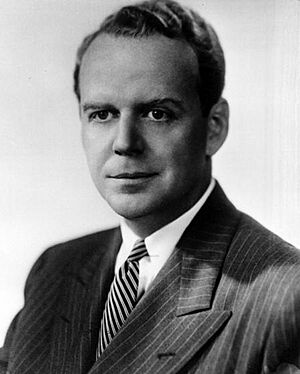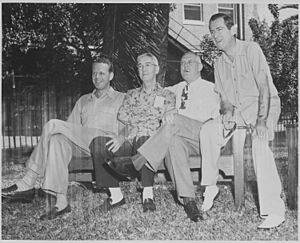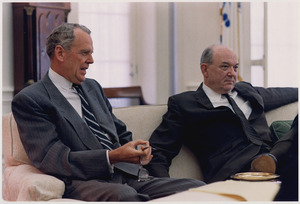Clark Clifford facts for kids
Quick facts for kids
Clark Clifford
|
|
|---|---|

Official portrait, c. 1947
|
|
| 9th United States Secretary of Defense | |
| In office March 1, 1968 – January 20, 1969 |
|
| President | Lyndon B. Johnson |
| Deputy | Paul Nitze |
| Preceded by | Robert McNamara |
| Succeeded by | Melvin Laird |
| Chair of the President's Intelligence Advisory Board | |
| In office April 23, 1963 – February 29, 1968 |
|
| President | John F. Kennedy Lyndon B. Johnson |
| Preceded by | James Killian |
| Succeeded by | Maxwell D. Taylor |
| 2nd White House Counsel | |
| In office February 1, 1946 – January 31, 1950 |
|
| President | Harry Truman |
| Preceded by | Samuel Rosenman |
| Succeeded by | Charles Murphy |
| Personal details | |
| Born |
Clark McAdams Clifford
December 25, 1906 Fort Scott, Kansas, U.S. |
| Died | October 10, 1998 (aged 91) Bethesda, Maryland, U.S. |
| Resting place | Arlington National Cemetery |
| Political party | Democratic |
| Spouse |
Margery Pepperell Kimball
(m. 1931) |
| Children | 3 |
| Education | Washington University (BA, LLB) |
| Military service | |
| Branch/service | United States Navy |
| Years of service | 1944–1946 |
| Rank | Captain |
Clark McAdams Clifford (December 25, 1906 – October 10, 1998) was an American lawyer. He was a very important political helper to several Democratic presidents. He advised presidents Harry S. Truman, John F. Kennedy, Lyndon B. Johnson, and Jimmy Carter.
Clifford held official government jobs like White House Counsel (1946–1950). He also chaired the President's Intelligence Advisory Board (1963–1968). Later, he became Secretary of Defense (1968–1969). He was also a powerful unofficial adviser. He was known for his charm and sharp suits.
All four Democratic presidents during the Cold War era used Clifford's advice. This shows he was a true "Washington insider." Even when Jimmy Carter became president in 1976, his team didn't want Clifford's help. But Carter ended up relying on him anyway.
In his later years, Clifford faced some problems. He was part of a big bank scandal, which led to serious accusations against him.
Contents
Early Life and Career
Clark Clifford was born on December 25, 1906. His hometown was Fort Scott, Kansas. His father worked as a traveling auditor for a railroad company. Clifford went to Washington University in St. Louis.
He became a successful lawyer in St. Louis. He practiced law there from 1928 to 1943. During World War II, he served in the U.S. Navy from 1944 to 1946.
Becoming a Presidential Adviser

In 1945, Clifford was sent to work at the White House. He quickly became a captain in the Navy. He served as an assistant to President Harry S. Truman. Clifford soon became a trusted friend and adviser to Truman.
After leaving the Navy, he stayed with Truman. He served as the White House Counsel from 1946 to 1950. Truman quickly learned to trust Clifford's advice.
Clifford helped Truman win the 1948 election. Truman's victory over Thomas Dewey was a big surprise. Clifford told Truman to act like a champion for ordinary people. This helped against other candidates.
Clifford also pushed for strong civil rights. This upset some Southern Democrats. But his plan helped the Democratic Party support civil rights.
One of his most important actions was supporting the new state of Israel in 1948. He argued for its recognition, even when others disagreed.
Clifford also helped write a secret report for President Truman in 1946. This report, called the Clifford-Elsey Report, talked about the Soviet Union. It showed how the Soviets had broken agreements. This report helped shape the U.S. approach to the Cold War. He also helped create the National Security Act of 1947. This law set up important parts of the U.S. government, like the CIA.
After 1950, Clifford left government work. He continued his law practice in Washington, D.C. But he kept advising Democratic Party leaders. One of his clients was John F. Kennedy, who was a U.S. Senator then.
Clifford led the team that helped John F. Kennedy prepare to become president. In 1961, Kennedy appointed Clifford to an intelligence advisory board. Clifford became its chairman in 1963.
After Kennedy's assassination in 1963, Lyndon B. Johnson became president. Clifford often advised Johnson. He even went on a trip to South Vietnam in 1967.
The USS Liberty Incident
Clifford was in charge of the President's Intelligence Advisory Board during the 1967 Six-Day War. He oversaw the investigation of the USS Liberty incident. This was when an American ship was attacked by Israeli forces.
Clifford was a strong supporter of Israel. But he was confused by Israel's explanation of the attack. He said, "We were baffled." He found it hard to believe the attack was a mistake. He noted the Liberty was much larger and looked very different from an Egyptian ship.
He believed Israeli forces should have easily identified the American ship. He felt the attack was a "flagrant act of gross negligence." He wanted Israel to be held responsible.
Clifford wrote a report in 1967 about the incident. He said he didn't know who authorized the attack. He felt the full truth might never come out. He was troubled by the incident and felt Israel didn't explain or make up for it enough.
Secretary of Defense

On January 19, 1968, President Johnson chose Clifford to be the new United States Secretary of Defense. He took over from Robert McNamara. Many people in Washington respected Clifford. They thought he was a good choice.
Some thought Clifford would want to increase the war effort in Vietnam. But Clifford said he was neither a "hawk" (someone who wants more war) nor a "dove" (someone who wants peace). He was secretly against the war since 1965.
Clifford kept many of the management systems McNamara had put in place. He didn't change policies on nuclear weapons or NATO. He did support a missile defense system called Sentinel. He believed it would encourage the Soviet Union to talk about arms control. These talks later led to a treaty in 1972.
Clifford also continued efforts to save money in the Defense Department. He announced over $1.2 billion had been saved in 1968. He also cut some military units and ships to reduce spending.
Vietnam Policy
When Clifford became Secretary of Defense, he wanted to rethink the Vietnam War. He had argued against sending more troops in 1965. But he publicly supported the president's decisions.
On March 31, 1968, President Johnson stopped bombing most of North Vietnam. This was to try and start peace talks. Johnson also announced he would not run for re-election. This surprised everyone, including Clifford. Soon, North Vietnam agreed to talks in Paris. Later, on October 31, 1968, all bombing in North Vietnam stopped. Clifford strongly supported this.
Clifford also had to deal with requests for more troops in Vietnam. When he started, there were 525,000 troops authorized. He convinced Johnson to say no to a request for 206,000 more troops.
However, Johnson did send 24,500 more troops in March 1968. This raised the authorized number to 549,500. Clifford wanted the South Vietnamese army to do more of the fighting. He also wanted to limit U.S. troops and reduce the fighting.
Clifford eventually agreed with McNamara's views on Vietnam. He believed there should be no more U.S. troops. He supported stopping the bombing and slowly pulling out of the conflict. He later said, "I found out that we couldn't win the war." He felt they would just waste lives and money.
After leaving office, Clifford wrote in Foreign Affairs magazine in 1969. He said, "Nothing we might do could be so beneficial... as to begin to withdraw our combat troops." He believed it was time to disengage.
Clifford's time as Secretary of Defense was short. But his reputation actually improved. He worked well with the U.S. Congress. He helped manage the first steps of reducing U.S. involvement in Vietnam. He strongly influenced Johnson to de-escalate the war.
Later Career and Controversy
Clifford's law practice made him very rich. He was known as one of Washington's "superlawyers." His office even overlooked the White House. This showed his long experience in the capital.
In 1980, President Carter sent him as a special helper to India. Clifford also made headlines by threatening Ayatollah Khomeini of Iran. This was during talks to release American hostages.
Bank Controversy
In his later years, Clark Clifford became involved in a major banking controversy. He was the chairman of First American Bankshares from 1982 to 1991. This bank became the largest in Washington, D.C.
It was later discovered that another bank, the Bank of Credit and Commerce International (BCCI), secretly owned First American. This was against banking rules. Investigators found that BCCI had secretly bought control of First American.
Clifford was accused of misleading government regulators. He had told them that BCCI would not control First American. It was also found that Clifford had made a large profit from bank stock. He had bought this stock with a loan from BCCI that had no security.
Clifford said he didn't know about any illegal activities. He insisted he had been tricked about BCCI's involvement. He faced serious accusations of fraud and conspiracy. However, these charges were dropped in 1993 because of his poor health. In 1998, the year he died, he and his partner settled lawsuits against them.
Personal Life and Death
Clark Clifford married Margery Pepperell Kimball in 1931. They had three daughters. Clifford was a Christian Zionist, meaning he supported Israel based on his Christian faith.
Clifford died on October 10, 1998, at age 91. He was buried at Arlington National Cemetery.
Awards
- 1969: He received the Presidential Medal of Freedom, with Distinction. President Johnson gave him this award on his last day in office.
- 1978: He received the Golden Plate Award from the American Academy of Achievement.
Legacy
Clark Clifford quickly became a national figure. He went from a low-level Navy aide to President Truman's top adviser. He was successful because he worked hard and was smart. He was good at dealing with the press. He also knew how to use good ideas, even if they came from others.
He became a trusted adviser to John F. Kennedy in 1960. His reputation and law practice grew. Finally, Lyndon B. Johnson made him Defense Secretary. This was to help the nation get out of the Vietnam War.
Historian Walter Isaacson said Clifford was like other wise men who shaped American foreign policy. But Isaacson also said Clifford was seen as someone who played political games.
Clark Clifford has been shown in movies. Tony Goldwyn played him in the 1995 TV movie Truman. Donald Sutherland played him in the 2002 TV movie Path to War.
Works
In 1991, Clifford's memories were published in a book called Counsel to the President. He wrote it with Richard Holbrooke. The book came out just as his name was linked to the BCCI bank scandal.
Images for kids


